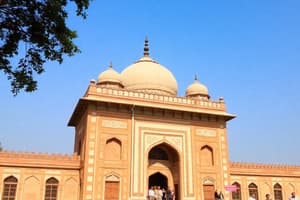Podcast
Questions and Answers
What were Aurangzeb's early education subjects?
What were Aurangzeb's early education subjects?
- Arabic, Chinese, Greek, and Latin
- Persian, Arabic, Sanskrit, Hadith, and Fiqh (correct)
- Hindi, French, Spanish, and Italian
- Mathematics, Science, English, and History
What made Aurangzeb stand out amongst his siblings?
What made Aurangzeb stand out amongst his siblings?
- Physical strength
- Intelligence and discipline (correct)
- Artistic talent
- Military prowess
How did Aurangzeb ascend to the Mughal throne?
How did Aurangzeb ascend to the Mughal throne?
- Engaged in a military coup
- Won a popular vote
- Offered the throne by his father
- Skillfully maneuvered the political landscape (correct)
What significant administrative reform did Aurangzeb institute?
What significant administrative reform did Aurangzeb institute?
Which emperor preceded Aurangzeb?
Which emperor preceded Aurangzeb?
In which year did Aurangzeb ascend to power?
In which year did Aurangzeb ascend to power?
What was the name of the department established by Aurangzeb to oversee the central treasury and manage imperial finances?
What was the name of the department established by Aurangzeb to oversee the central treasury and manage imperial finances?
Which region did Aurangzeb conquer during his reign?
Which region did Aurangzeb conquer during his reign?
What tax did Aurangzeb impose on non-Muslims?
What tax did Aurangzeb impose on non-Muslims?
What were some factors contributing to the decline of the Mughal Empire during Aurangzeb's rule?
What were some factors contributing to the decline of the Mughal Empire during Aurangzeb's rule?
How did Aurangzeb's religious policies impact non-Muslims?
How did Aurangzeb's religious policies impact non-Muslims?
What is a debated aspect of Aurangzeb's legacy among scholars?
What is a debated aspect of Aurangzeb's legacy among scholars?
Study Notes
Aurangzeb: A Mughal Emperor's Life and Legacy
Aurangzeb, born on November 3, 1618, was the sixth Mughal emperor, reigning from 1658 to 1707. Throughout his long and tumultuous rule, Aurangzeb's life and legacy encompassed both remarkable achievements and challenging decisions that continue to draw scholarly attention to this day.
Early Life
The young prince, known for his studious habits, was raised by his father, Shah Jahan, in the Mughal court. Aurangzeb's early education included Persian, Arabic, and Sanskrit, as well as religious studies, such as Hadith and Fiqh. His talents with numbers and mathematics, inherited from his mother, made him an asset to the Mughal administration. Aurangzeb's intelligence and discipline stood out amongst his siblings, making him a formidable rival to his brothers for the throne.
Ascension to Power
When his father, Shah Jahan, fell into a state of ill health, the princes vied for power. Aurangzeb skillfully maneuvered the political landscape, ultimately outsmarting his brothers and claiming the Mughal throne. His ascension to power in 1658 marked the beginning of a reign unrivaled in longevity among his predecessors.
Administrative Reforms
Aurangzeb's reign saw a number of significant administrative reforms. He was rigorous in the collection of revenue, instituting a more efficient system of land revenue assessment. He also established a new department, known as the Diwan-i-In'am, to oversee the central treasury and manage the imperial finances. This led to a period of prosperity and economic growth.
Military Campaigns
Aurangzeb's reign was marked by military campaigns, both on the northern frontier and within the Indian subcontinent. His campaigns against the Rajputs and Marathas were noteworthy, as was his conquest of the Deccan. However, these campaigns also involved substantial loss of life and resources.
Religious Affairs
Aurangzeb's religion played a significant role in his life and governance. He was a devout Muslim, and his policies reflected his religious convictions. Aurangzeb was known for his efforts to implement shari'ah law in the empire. He also imposed a jizya tax on non-Muslims, which had not been collected by previous Mughal emperors. Aurangzeb's religious zeal was also evident in his destruction of Hindu temples and the imposition of restrictions on non-Muslims.
Decline of the Mughal Empire
Aurangzeb's reign was not without its challenges. The Mughal Empire began to decline during his rule, with factors such as increased military expenditure, religious polarization, and the growing power of regional rulers contributing to the empire's decline.
Death and Legacy
Aurangzeb passed away on March 3, 1707, at the age of 88. His reign had been marked by both extraordinary achievements and profound challenges. Aurangzeb's legacy, however, continues to be debated among scholars. While some argue that he was a unifier and a visionary, others view him as a divisive and autocratic figure.
The complexity of his reign and the multifaceted nature of his policies continue to make Aurangzeb a fascinating figure in the history of the Mughal Empire. His reign provides a unique window into the intricate dynamics of the Indian subcontinent during the 17th century, and his legacy continues to inform and challenge scholars to this day.
Studying That Suits You
Use AI to generate personalized quizzes and flashcards to suit your learning preferences.
Description
Test your knowledge on the life and legacy of Aurangzeb, the sixth Mughal emperor who reigned from 1658 to 1707. Explore his early life, ascension to power, administrative reforms, military campaigns, religious policies, the decline of the Mughal Empire, and his controversial legacy.




